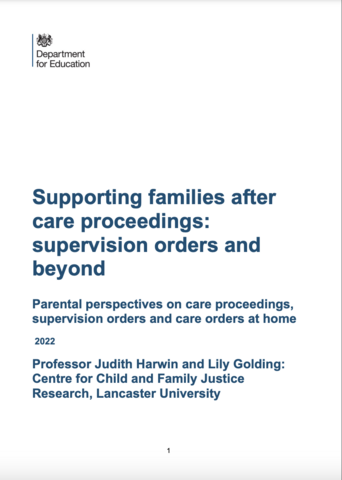This UK Department for Education report charts the experiences and views of parents in the UK whose children were made subject to a supervision order or a care order at home at the end of care proceedings.
Both are ways of keeping families together when it is safe to do so. The supervision order is a short-term order, which is typically made for one year. It can be renewed annually for up to three years. It places a duty on the local authority to ‘advise, assist and befriend the supervised child’.
Only the parent has parental responsibility. When a child is made subject to a care order at home, parents share responsibility with the local authority. The order lasts until the child reaches eighteen unless the local authority discharges it earlier or the parent successfully applies for its discharge. The child is a ‘looked after child’ within the terms of regulations and guidance and can be removed from parents without the need to return to court.

